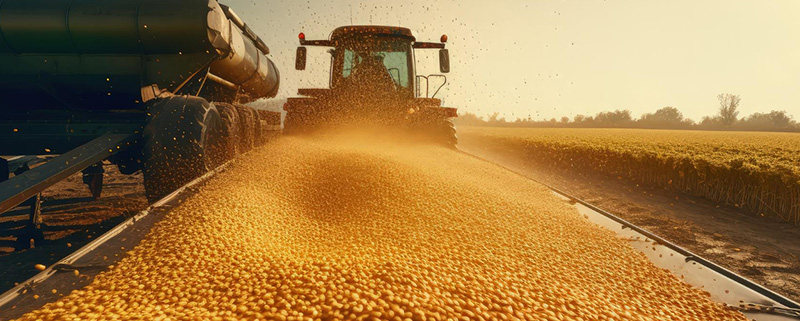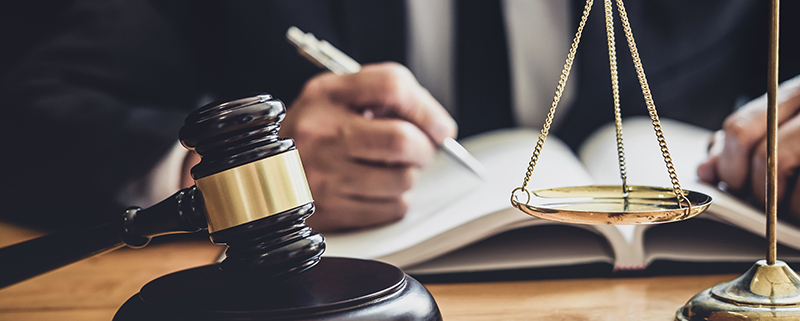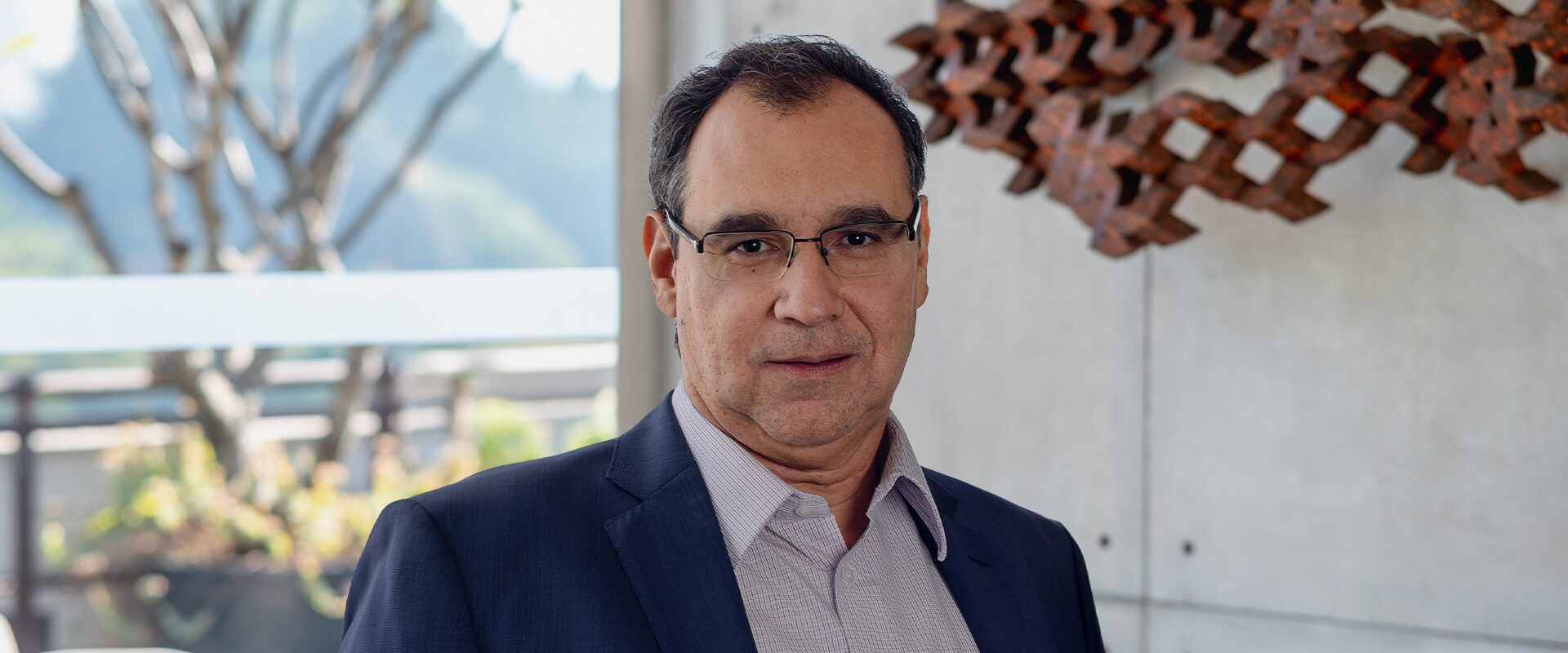
The Agribusiness Newsletter brings information and news about the main regulations and legal texts relating to the regulation of agribusiness in Brazil. This initiative seeks to cover the agribusiness industry on its transactional, litigation, tax and regulatory levels, and is an invitation for all of those working in this market to both access important news and comments on vital topics from the sector.
This material is for informative purposes only, and should not be used for decision-making. Specific legal advice can be provided by our legal team.
NEWS

Demand for agricultural credit exceeds BRL 1 trillion and attracts new generation of investors
According to data released by the Ministry of Agriculture and Livestock (“MAPA”), demand for agricultural credit in Brazil exceeded the historic mark of BRL 1 trillion in the 2024-2025 biennium. This record volume shows the steady growth of the farming sector and the increasing complexity of financial transactions in the countryside, sparking interest from a new generation of investors and financial institutions.
Technological advances and the digitization of agribusiness have attracted fintechs, asset managers, and credit platforms seeking to offer more agile and customized solutions to rural producers. This transformation has expanded access to financing, especially for small and medium-sized producers, who previously faced greater barriers to obtaining credit from traditional institutions.
In addition, capital markets have played an increasingly important role in financing agribusiness. Instruments such as Agribusiness Receivables Certificates (“CRA”) and Investment Funds in Agroindustrial Productive Chains (“FIAGRO”) are becoming more popular, connecting urban investors to the countryside and diversifying the sources of funding for the sector.
For more information, access the article in full.
Brazilian Agribusiness Congress discusses prospects for financing via capital markets
The Brazilian Agribusiness Congress, an event organized by the Brazilian Agribusiness Association in partnership with B3, will take place on August 11, 2025, in São Paulo.
The congress will be attended by directors and superintendents from the Brazilian Financial and Capital Markets Association (“ANBIMA”), the Brazilian Securities and Exchange Commission (“CVM”), and B3, as well as financial institutions.
Registration is available on the event website: https://congressoabag.com.br/.
For more information, access the article in full.
Capital markets maintain fundraising above BRL 300 billion in offerings during first half of 2025
According to ANBIMA’s Capital Markets Newsletter, Brazilian capital markets maintained fundraising momentum during the first half of 2025, with BRL 328.4 billion raised in public offerings. Among the highlights, financial instruments linked to agribusiness, such as CRAs and FIAGRO, remain increasingly popular as structured financing alternatives for the sector.
CRAs recorded BRL 14.2 billion in funding in the first half of the year, with 59 completed transactions. They remain one of the main tools for securitizing agribusiness receivables. The number of transactions shows the continued demand for this type of instrument, especially among issuers linked to the production and sale of grains, animal protein, and agricultural inputs.
FIAGROs, especially when structured as real estate investment funds (FIAGRO-FII), continue to expand. The March 2025 CVM newsletter points out that the total net worth of the FIAGRO industry reached BRL 44.7 billion, a 204% increase in two years. By May 2025, the number of operational funds had reached 145, of which 48% were Credit Rights Investment Funds (“FIAGRO-FIDC”).
The composition of FIAGRO portfolios reveals a strong presence of securitization assets: Real Estate Receivables (“CRIs”) and CRAs represent 49% of total investments, totaling BRL 13 billion. This preference demonstrates harmony between the two instruments and the central role that agribusiness receivables have been playing in structuring these funds’ portfolios.
With continued appetite for agribusiness assets and regulatory advances, capital markets are consolidating their position as a strategic pillar for financing the sector. New issuances and the consolidation of FIAGROS are expected to further expand the role of private investors in the development of the Brazilian agroindustrial chain during the second half of the year.
For more information, access the article in full.
CBIOs trading on B3 totals BRL 2.88 billion during first half of 2025
Decarbonization Credits (“CBIOs”) trading on B3 totaled BRL 2.88 billion during the first half of 2025, the equivalent of over 38 million traded securities. CBIOs are instruments created under the RenovaBio program and represent one ton of carbon avoided through the production and use of biofuels. Credits are mainly purchased by fossil fuel distributors to offset their emissions and have attracted interest from institutional investors and individuals.
B3 has invested in structuring a more accessible and transparent market for CBIOs, including electronic trading, public prices, and real-time registration. This infrastructure has contributed to increased liquidity and confidence in the instrument, as well as to bringing capital markets closer to Brazil’s environmental and climate goals.
As the demand for sustainable assets grows, CBIOs have established themselves as a significant alternative within the ESG agenda. Trading volume is expected to remain high in the coming quarters, driven by both regulatory obligations and growing investor interest in assets linked to the energy transition.
For more information, access the article in full.
AGRO IN THE MEDIA
Brazil’s general environmental licensing law could allow projects to be approved without impact studies
REGULATION

TAX REGULATION
IOF increase – news and legal discussion
Due to the political deadlock resulting from the increase in the Tax on Financial Transactions (“IOF”) by Decrees No. 12,466/2025, No. 12,467/2025, and No. 12,499/2025 – and the subsequent reinstatement of the previous rules through Legislative Decree No. 176/2025 – actions challenging the constitutionality of the decrees regarding the IOF increase were filed, the Direct Action for the Declaration of Unconstitutionality “(ADI”) No. 7827 and No. 7839, and Actions for Declaration of Constitutionality (“ADCs”) Nos. 96 and 97.
On July 16, 2025, Justice Alexandre de Moraes ordered, subject to approval by the Plenary of the Federal Supreme Court, the reinstatement of Decree No. 12,499/2025, effective immediately (as of the publication of the decision), except for the provisions regarding the levy of the IOF tax on high-risk transactions.
In a subsequent decision, Justice Alexandre de Moraes ruled out the retroactive effect on the IOF rates of Decree No. 12,499/2025 during the period in which the executive order was suspended.
Details on these changes and the current regulation can be found in our client alert.
Brazil’s Federal Revenue Service regulates submission of 2025 DITR
The Federal Revenue Service of Brazil (“RFB”) published Normative Instruction (“IN”) No. 2,273/2025 to regulate the submission of the Rural Territorial Property Tax Return (“DITR”) for the 2025 fiscal year. The regulation establishes the deadline and procedures for submitting the DITR. Details on the main guidelines for completing and submitting the DITR are available in our client alert.
ENVIRONMENTAL REGULATION
Environmental licensing
FEDERAL
Congress approves new environmental licensing regulations focused on simplified and streamlined processes
On July 17, 2025, the Brazilian House of Representatives passed Bill (“PL”) No. 2,159/2021, establishing general guidelines for environmental licensing in Brazil. The text, which incorporates 29 Senate amendments, will be forwarded to the president for approval, with no date yet set for consideration.
The proposal creates different types of environmental licenses, such as the Special Environmental License (“LAE”), aimed at projects considered strategic by the Government Council. The LAE may also be granted for activities with significant potential for environmental degradation, with a single-phase analysis and validity of 5 to 10 years.
Another highlight is the Environmental License by Adhesion and Commitment (“LAC”), which simplifies the licensing process for small or medium-sized activities with low or medium pollution potential. The LAC waives impact studies and may be used, for example, in highway duplication works and transmission line installation, provided that technical and environmental criteria are met.
The text also changes the participation of agencies such as the National Indigenous Peoples Foundation (“FUNAI”), the National Historical and Artistic Heritage Institute (“IPHAN”), and the Chico Mendes Institute for Biodiversity Conservation (“ICMBio”) in the licensing process, limiting their involvement to specific deadlines and areas with approved demarcation or formal listing. The opinions of these agencies will only be considered if submitted within the legal deadline of 45 days, as established in the new provisions for all agencies mentioned. In addition, the licensing authority will not be required to justify its decision based on the opinions received.
PL No. 2,159/2021 also provides for:
- Automatic renewal of licenses for low- or medium-impact projects, upon a statement by the project developer;
- Waiver of licensing for maintenance work on existing infrastructure;
- Exclusion of the requirement of state authorization for deforestation of primary or secondary vegetation in an advanced stage in the Atlantic Forest, and of municipal authorization for vegetation in a medium stage, provided that the municipality has an environmental council; and
- Prevailing decision of the licensing agency over fines imposed by other entities, such as the Brazilian Institute for the Environment and Renewable Natural Resources (“IBAMA”), in case of conflict.
Disagreements among lawmakers marked the vote. While supporters of the bill highlighted modernization and legal certainty for businesses, critics argued that it could lead to environmental setbacks and weaken the protection of sensitive biomes.
For more information, access the article in full.
ACRE
Acre regulates environmental licensing for forest management in public forests
On July 08, 2025, the State Council for the Environment and Forests (“CEMAF”) published CEMAF Resolution No. 4/2025, which establishes the technical and administrative procedures for environmental licensing of sustainable forest management activities in public forests in the state of Acre, through concessions for consideration. The regulation aims to govern local companies or communities’ exploitation of forest resources, ensuring environmental sustainability and compliance with current legislation.
The resolution applies to public forests under the control of the Federal Government, states, municipalities, the Federal District, or indirect administration entities. It defines concepts such as sustainable forest management, forest concession, management unit, concession lot, local communities, forest inventory, Sustainable Forest Management Plan (“PMFS”) and Annual Operational Plan (“POA”).
For business exploitation via forest concessions, the winning bidder may only initiate activities after obtaining an environmental license from the Acre Institute of the Environment (“IMAC”), upon presentation of detailed technical and legal documentation, as per Annex 1 of the regulation. Among the required documents are the PMFS, the POA, the concession contract, the commitment to maintain the managed forest, the Technical Responsibility Note, and proof of publication of the license application.
In cases of community forest management in conservation units with local population settlements, licensing will follow specific criteria, respecting the concession’s zoning and current environmental legislation. Annex 2 describes the required documentation, including the community use concession document, the Individual Taxpayer Registration Number (“CPF”) Personal Identification Number (“RG”) of the participants, and the approved management plan.
IMAC will have up to 60 days to review licensing applications, a period that may be extended upon justification. The project developer will also have up to 60 days to resolve any documentary or technical issues, under penalty of the case being closed. A technical inspection will be mandatory in cases of authorization renewal where exploration has already been carried out.
The regulation also stipulates that, in the event archaeological sites are identified, IPHAN regulations and the applicable federal and state legislation must be followed.
RIO DE JANEIRO
Rio de Janeiro approves sustainability rule for environmental licensing
On July 28, 2025, the State Environmental Institute (“INEA”) published Inea Resolution No. 318/2025, approving Operational Rule NOP-INEA-60.R-0, establishing sustainability criteria in environmental licensing.
The INEA Board of Directors deliberated on the rule at a meeting held on May 27, 2025. It is based on state legislation governing the State Licensing System and other Environmental Control procedures (“SELCA”), according to State Decrees No. 46,890/2019 and No. 47,550/2021.
NOP-INEA-60.R-0 defines technical guidelines for incorporating sustainability criteria into environmental licensing processes. The goal is to strengthen environmental protection and encourage more responsible practices by licensed businesses.
INEA Resolution No. 318/2025 will take effect 180 days after its publication.
GOIÁS
Goiás changes classification of activities subject to environmental licensing
On July 08, 2025, the State Secretariat for the Environment and Sustainable Development (“SEMAD”) published SEMAD IN No. 10/2025, changing the classification of activities listed in the Single Annex to State Decree No. 9,710/2020, which establishes the general rules for environmental licensing in the State of Goiás.
The regulation modifies the section “Typology and Size of Projects and Activities Subject to Environmental Licensing,” updating classification criteria according to size and pollution potential. The changes apply exclusively to the types expressly mentioned in the new Single Annex to SEMAD IN No. 10/2025, while the other provisions of the original decree remain unchanged.
Among the changes, the following stand out:
- Inclusion of specific criteria for mining complexes with multiple typologies (Group B2.14), classified according to gross annual production;
- Update of the classification for grain ethanol industrial plants (Group C11.5), based on daily installed capacity;
- New metrics for non-residential photovoltaic or thermosolar power generation (Group E2.11), based on total installed area.
The changes’ implementation will depend on updating the typologies in the Periodic and Occasional Information Submission System (“IPÊ”), which will be provided following the regulation’s publication. In addition, the changes will be ratified by decree.
Climate Change
PARÁ
Pará approves climate plan for agriculture and creates state management group
On July 01, 2025, the Government of the State of Pará published Decree No. 4,774/2025, approving the State Plan for Adaptation to Climate Change and Low Carbon Emissions in Agriculture (“ABC+PA Plan”) and establishing the State Management Group (“GGE”) responsible for its implementation and monitoring
The ABC+PA Plan aims to boost sustainable farming in the state, make production systems more efficient and resilient, set goals for 2030, encourage low-carbon tech, provide technical support and partnerships in production chains, and help make farming in Pará more inclusive and sustainable.
The plan’s structure includes characterization of agricultural, livestock, and planted forest production; identification of climate vulnerabilities; definition of measures to reduce greenhouse gas emissions and increase the resilience of production systems; and a monitoring program with goals, deadlines, and indicators. The plan’s development and implementation follow the guidelines of the Pará State Climate Change Policy (State Law No. 9,048/2020) and the National Climate Change Policy (Federal Law No. 12,187/2009).
The GGE will guide, implement, monitor, evaluate, and review the plan, establish priorities, integrate actions and public policies, propose normative acts, and organize events and training sessions. The GGE will be coordinated by the State Secretariat for Agricultural Development and Fisheries (“SEDAP”), which will also publish its internal regulations. The group will be composed of representatives from state agencies linked to agriculture, the Ministry of Agriculture, farmers representing different sizes of farms, family farmers, and civil society, including research institutions, rural credit institutions, and non-governmental organizations (“NGOs”). Participation is considered a significant unpaid public service, and the group may establish technical chambers for specialized advice.
Administrative Proceedings
RIO DE JANEIRO
Rio de Janeiro authorizes notification of administrative fines via SMS and defines statute of limitations for lack of response
On July 08, 2025, the Legislative Assembly of the State of Rio de Janeiro published Law No. 10,854/2025, which provides for the notification of administrative fines, including traffic fines, via Short Message Service (“SMS”) messages, and establishes the statute of limitations for punitive claims in the event of no response to an appeal.
The regulation authorizes all state agencies to notify offenders via SMS at least 48 hours in advance about the progress of administrative proceedings. This notification will only be valid for taxpayers who have previously registered voluntarily in the state database, without any additional charges.
In addition, the authorities may send physical notifications at least 15 days in advance regarding fines and deadlines for submitting defenses or appeals. Physical notification does not replace the requirement for SMS notification.
Law No. 10,854/2025 also determines that the Executive Branch will regulate the aspects necessary for its implementation.
AMAPÁ
Amapá regulates administrative proceeding to investigate environmental violations
On July 24, 2025, the Government of the State of Amapá published Decree No. 7,316/2025, which regulates Articles 70 (and following) of Federal Law No. 9,605/1998 (“Environmental Crimes Law”). In addition, the decree provides for enforcement actions and administrative proceedings to investigate environmental violations at the state level.
The regulation establishes the principles that should guide environmental inspection and administrative proceedings, such as legality, publicity, reasonableness, adversarial proceedings, full defense, and efficiency. In addition, the regulation defines the concepts of enforcing agent, infraction notice, offender, notification, and inspection report.
The decree grants the State Secretariat for the Environment (“SEMA”) and municipal environmental agencies the authority to issue violation notices and initiate administrative proceedings, with the support of trained military police and firefighters. Inspection teams have unrestricted access to public and private establishments to assess damage and apply precautionary measures.
Among the administrative measures provided for are: seizure, embargo, destruction or disposal of goods, demolition, suspension of sale or manufacture of products, and suspension of activities. Such measures are self-executing and do not require a court order.
The decree also creates the Environmental Conciliation Chamber (“CCA”) within Sema, which is responsible for facilitating consensual solutions for environmental violations. Violators may sign an Environmental Consent Decree (“TAC”), an extrajudicial enforcement order, to opt for discounted payment, installment plans, or the conversion of fines into environmental services.
The regulation details the investigation and trial process, administrative deadlines, defense, appeals, and statutes of limitations. It also establishes that the decree immediately affects all pending environmental administrative proceedings and repeals Articles 53 to 92 of Decree No. 3,009/1998.
Financial Incentives and Access to Rural Credit
SÃO PAULO
São Paulo sets rules for access to rural credit from FEAP/BANAGRO
On July 02, 2025, the Guidance Council of the São Paulo Agribusiness Expansion Fund (“FEAP”) published CO/FEAP/BANAGRO Resolution No. 17/2025, establishing the conditions and general procedures for obtaining the Declaration of Aptitude (“DAF”) from FEAP, the operationalization of rural credit lines, and other related matters.
The DAF is the instrument that enables family farmers, artisanal fishermen, extractivists, associations, and cooperatives to access FEAP’s financial resources. The declaration is valid for two years and must be issued by technicians from the Comprehensive Technical Assistance Coordination Office (“CATI”) or the São Paulo Institute of Higher Studies (“ITESP”) through the computerized system of the Secretariat of Agriculture and Supply (“SAA”). Issuance is conditional upon the presentation of supporting documents and technical visits.
To qualify, producers (individuals or legal entities) must have a gross annual income of up to BRL 3 million, at least 50% of which must come from agricultural activities, and operate up to 10 fiscal modules. Associations and cooperatives must prove gross income or annual surplus of up to BRL 4.8 million and have most members or cooperatives with a valid DAF or active registration with the Financial Assets Catalogue (“CAF”).
The resolution also details the documents required for each category of beneficiary, including artisanal fishermen, extractivists, organic producers, and those in agroecological transition. In addition, from an environmental perspective, the regulation establishes that rural properties linked to financing must have an active Rural Environmental Registry (“CAR”) with no pending issues.
Credit transactions follow the FEAP Targeted Rural Credit model—including pre-credit, contracting, and post-credit stages—and require proof of the application of funds through fiscal documents. Beneficiaries who are in good standing are entitled to a 25% bonus on transaction fees. There are also rules for extending and renegotiating debts, subject to a technical report and supporting documentation.
The regulation allows for more than one loan per borrower, provided that debt limits are respected and the borrower’s ability to pay is proven. Finally, it establishes a schedule of notifications and collection measures for default, including protest at a notary’s office and registration in the Public Sector Debt Registry (Cadin Estadual).
São Paulo launches credit line to boost organic and agroecological production
On July 02, 2025, FEAP’s Guidance Council published CO/FEAP/BANAGRO Resolution No. 18/2025 , which establishes criteria, limits, and financing conditions for implementing the Orgânicos Agro SP Project, focused on organic production and agrobiodiversity in the State of São Paulo. The measure is aligned with the State Policy on Agroecology and Organic Production and the State Plan for Agroecology and Organic Production. It aims to foster sustainable practices, agroecological transition, and value socio-biodiverse products.
The regulation recognizes the strategic importance of agroecology and organic production for sustainable development, food security, and environmental conservation. The creation of the credit line seeks to support small and medium-sized rural producers, cooperatives, and associations, offering specific conditions to enable investments in infrastructure, certification, sustainable management, and marketing of organic products. Although essential, the agroecological transition poses technical and financial challenges, especially for family farmers, which justifies the creation of support mechanisms such as those provided for in the resolution.
The measure aims to provide rural farming families in São Paulo with financial resources through a specific line of credit that meets the needs of agricultural activities based on the principles of agroecology, encouraging agroecological transition, organic production, the appreciation of socio-biodiversity products, and the sustainable management of native species, with the support of the SAA.
Among the key points of the regulation are:
- beneficiaries are rural producers classified under FEAP, as well as their associations and cooperatives;
- eligible items include investments in agroecological practices, purchase of inputs, technical services, certifications, processing, and marketing, with up to 30% of the amount allocated to operating costs;
- financing limits are up to BRL 250,000 for individual producers and up to BRL 800,000 for cooperatives or associations;
- payment terms are up to 84 months, with a grace period of up to 12 months, and can reach 120 months for projects with a forestry component;
- interest rates vary between 2% and 4% per year, depending on the beneficiary’s income bracket.
The regulation also establishes specific conditions, such as prohibiting the purchase of animals and tractors (except microtractors and motor cultivators), requiring a technical approval letter from CATI, and requiring a bank account linked to the beneficiary’s CPF or National Corporate Registration Number (CNPJ). The line of credit is available statewide, and the guarantees required are surety bonds for producers and endorsements from legal representatives for cooperatives and associations.
The total amount of funds available is estimated at BRL 2 million, to be distributed during the current and two subsequent fiscal years, depending on budget availability. The SAA, through CATI and the ITESP Foundation, will be responsible for technical monitoring and project classification.
MARANHÃO
Maranhão limits contributions to state funds for grain industries with large investments
On July 16, 2025, the Government of the State of Maranhão published Provisional Measure (“MP”) No. 498/2025 , which establishes limits on the requirement for contributions to state funds levied on tax incentives enjoyed by industries and agribusinesses engaged in grain crushing and processing. The regulation also exempts these companies from the obligation to contribute to certain state funds, provided they meet specific investment criteria.
The MP sets the total tax rate at 4% for companies that, in addition to their main activity, crush and process grains in the state. This percentage includes only the contribution to the State Industrial Development Fund (“FDI”), as provided for in Law No. 10,690/2017. The limit applies only to companies benefiting from tax incentives granted under Laws No. 10,690/2017 and/or No. 10,386/2015.
In addition, the regulation exempts these companies from the obligation to contribute to the Maranhão Agricultural and Agroindustrial Development Fund (Law No. 10,386/2015), the Mais IDH Program (Law No. 10,690/2017) and the Maranhão Fund to Combat Poverty (Law No. 8,205/2004). The exemption is conditional on investments in the state equal to or greater than BRL 2 billion, considering the implementation and possible expansion of the projects.
It should be noted that MP No. 498/2025 exclusively addresses the management of contributions to state funds and does not imply the granting, alteration, or extension of tax benefits related to the Tax on Circulation of Goods and Services (“ICMS”). Contributions already made up to the date of entry into force of the regulation are considered valid and do not give rise to any right to refund or compensation.
The regulations governing the procedures for compliance with the new limits will be defined by the Executive Branch.
TOCANTINS
Tocantins restricts incentives to agribusinesses that contradict free competition and Brazilian legislation
On July 22, 2025, the Government of the State of Tocantins published Law No. 4,791/2025 , which amends Law No. 4,350/2024 — responsible for establishing the State Policy for Incentives to Agroindustries — adapting it to the principles of free competition, sustainable development, and respect for Brazilian environmental legislation.
The new regulation adds Articles 5-A and 5-B to the original law, establishing express prohibitions on the granting of tax incentives and public land to companies in the agroindustrial sector that:
Article 5-A
- Enter into Brazilian or international agreements that impose restrictions on free competition or the expansion of agricultural activity in areas permitted by Brazilian law.
- Implement policies that contradict regulations issued by federal entities and that limit the full use of rural property, including land use and the social function of land; and
- Restrict or hinder the development of agricultural production in any region of the state of Tocantins.
Article 5-B
The law requires companies interested in tax benefits or public land concessions to submit a formal declaration that they are not involved in the activities mentioned above. The submission of false or inaccurate information will subject the applicant to the corresponding penalties.
AMAZONAS
Amazonas creates policy to boost agritechs and modernize the agricultural sector
On July 17, 2025, the Government of the State of Amazonas published Law No. 7,714/2025 , which establishes guidelines for encouraging the development of agritechs, aiming to boost tech innovation, sustainability, and competitiveness in the agricultural sector.
The regulation defines agritechs as startups and innovative companies focused on agribusiness, which use technologies such as artificial intelligence, the Internet of Things (“IoT”), big data, and precision agriculture (“PA”) to optimize the management of rural properties, which are conceptualized, respectively, as:
- PA – using technologies to increase efficiency in agricultural management;
- IoT – connecting physical objects to the internet for data exchange; and
- Big data – analyzing large volumes of data for strategic decisions.
The policy’s targets include:
- fostering the creation and development of agritechs;
- integration between universities, research centers, companies, and rural producers; and
- encouraging the adoption of sustainable technologies and modern agricultural practices.
The regulation also seeks to facilitate access to credit and financing for innovation projects, stimulate the training of skilled labor, reduce bureaucracy in administrative proceedings, and encourage events and conferences.
The law also establishes guidelines such as supporting innovation at all stages of production, fostering environmental and socioeconomic sustainability, stimulating technological development, and expanding the research and innovation network through strategic partnerships.
Biodiversity
ALAGOAS
Alagoas establishes State Policy for the Protection of Native Seeds and Agrobiodiversity
On July 01, 2025, the Government of the State of Alagoas published Law No. 9.576/2025 , which creates the State Policy on Native Seeds and Agrobiodiversity (“PESEMCA”), aimed at fostering the recovery, conservation, and protection of native seeds and agrobiodiversity in the state.
The regulation establishes that the policy will be integrated into public programs and policies aimed at food and nutritional security, with reference to regulatory frameworks such as the Organic Law on Food and Nutritional Security, the Food Acquisition Program, and the National Seed and Seedling System, among others.
Law No. 9,576/2025 defines fundamental concepts such as native varieties, agrobiodiversity, agroecosystems, cultivation, hybrids, and agrobiodiversity protection areas, emphasizing that native seeds are the sociocultural heritage of communities and cannot be patented or privately owned.
PESEMCA’s specific targets include: protecting agrobiodiversity and biomes; encouraging the recovery and perpetuation of traditional cultivars; valuing traditional knowledge; creating community seed banks; mapping agrobiodiversity; and boosting agroecological and technological research.
The policy will be implemented through two main instruments: the State Program for Community Banks of Native Seeds (“Sementes que Alimentam”) and the State Plan for the Recovery and Protection of Native Seeds and Conservation of Agrobiodiversity. The Executive Branch will be responsible for designating the coordinating body, which will be tasked with implementing and expanding seed banks, planning training activities, maintaining inventory control, and providing technical assistance to participating families.
The regulation also provides for policy financing mechanisms, with resources from the State Fund for Combating and Eradicating Poverty, sectoral budget allocations, and specific funds allocated in annual budget laws.
Agroecological Products
PARANÁ
Paraná establishes State Plan for Agroecology and Organic Production
On July 14, 2025, the Government of the State of Parana published Law No. 22,536/2025, which provides for the State Plan for Agroecology and Organic Production (“PLEAPO”) in the state, aimed at fostering agroecological transition and sustainable development, in addition to ensuring access to healthy food at fair and affordable prices.
The regulation establishes guidelines for agroecology and organic production, recognizing the importance of family farming, traditional peoples and communities, socio-biodiversity, and agrobiodiversity. It defines concepts such as agroecosystem, sustainable extractivism, urban and peri-urban agriculture, solidarity economy, environmental services, among others.
The law’s targets include: boosting food and nutrition sovereignty and security; encouraging people to eat food that’s free from transgenics and pesticides; valuing traditional knowledge; getting more women and young people involved in agroecological production; and encouraging the creation of transgenic- and pesticide-free areas.
The regulation also provides for promotional tools such as teaching, research, extension, environmental education, technical assistance and rural extension, state rural credit, incentives for school meals with organic products, and integration with federal and state public policies.
The Executive Branch may adopt measures such as the creation of a certification seal for agroecological products, specific lines of credit, agreements with educational and research institutions, calls for proposals, support for marketing, and prioritization of public purchases of agroecological and organic products.
Use of Water Resources
FEDERAL
IBAMA updates classification of hazardous substances discharged into water
On July 29, 2025, IBAMA published IBAMA IN No. 14/2025, which updates the classification list of harmful or hazardous substances according to the risk produced when discharged into water.
The measure complies with the sole paragraph of Article 4 of Law No. 9,966/2000 and adopts, with the same strictness and completeness, the list of the International Bulk Chemical Code (“IBC Code”), as per Annex II of the International Convention for the Prevention of Pollution from Ships (Marpol 73/78), updated by amendment MEPC.318 (74) of the International Maritime Organization (“IMO”), and enacted by Decree No. 10,984/2022.
The regulation amends the Annex to IN No. 10/2023, incorporating international updates on the classification of hazardous substances, to ensure greater alignment with global marine environmental protection guidelines. The new listing is essential for the control and environmental monitoring of substances transported by sea, contributing to the prevention of damage to aquatic ecosystems.
MINAS GERAIS
Minas Gerais regulates State Policy on Sustainable Irrigated Agriculture
On July 09, 2025, the Government of the State of Minas Gerais published Decree No. 49,072/2025, regulating provisions of Law No. 24,931/2024, which establishes the State Policy on Sustainable Irrigated Agriculture. The regulation addresses the collective granting of water resource use rights, the certification of irrigation projects, and the environmental regularization of irrigation-related works and infrastructure.
The decree establishes environmental sustainability, watershed recovery, water security, the use of low-impact technologies, and the inclusion of family farmers and small producers as guiding principles. It also defines categories of irrigating farmers (family, small, medium, and large) and concepts such as irrigation infrastructure, environmental and productive zoning (“ZAP”), and sustainability indicators in agrosystems.
The State Council for Agricultural Policy (“CEPA”) will be responsible for formulating strategies and monitoring the implementation of the policy. The State Plan for Sustainable Irrigated Agriculture (“PEAIS”), valid for 20 years and reviewed every five years, will be developed in a participatory manner and approved by CEPA. Regional irrigation plans are also planned, coordinated by the State Secretariat of Agriculture, Livestock, and Supply (“SEAPA”) with the participation of civil society and river basin committees.
Irrigation projects in operation until the publication of the decree must apply for a water use permit within 120 days and install flow measurement systems within 30 days. The certification of projects regarding rational water use will be coordinated by the Minas Gerais Water Management Institute, in conjunction with SEAPA, according to rules defined by joint resolution.
The decree also regulates the licensing and environmental regularization of irrigation works, recognizing those that foster environmental and social benefits as public utility. It also provides for the possibility of intervention in Permanent Preservation Areas and trails, provided that legal requirements are met and accompanied by environmental compensation.
The declaration of public utility for environmental intervention purposes will depend on technical and legal instruction and does not replace environmental licensing procedures. The ZAP will be used as a territorial planning and management tool, and will be mandatory for requests for declarations of public utility in certain situations.
Finally, the decree addresses environmental compensation measures and the updating of ZAPs prior to the enactment of Law No. 24,931/2024, in addition to amending Decree No. 48,707/2023 to include the analysis of environmental constraints in the irrigation process.
CEARÁ
Ceará updates water usage rates with a 6.38% adjustment
On July 11, 2025, the Ceará Water Resources Council (“CONERH”) published CONERH Resolution No. 5/2025, which establishes charges for the use of surface and groundwater resources owned by the State of Ceará or the Federal Government, by delegation of authority.
The regulation updates tariff values based on the Broad National Consumer Price Index (“IPCA”), accumulated between March 2024 and May 2025, and establishes specific billing criteria according to the type of use and the source of water collection.
In addition, differentiated tariffs were established for various categories of users, such as public supply, industry, fish farming, shrimp farming, irrigated agriculture, services and commerce, power generation by photovoltaic panels, transfer of reused water, and other uses. The values may vary according to the source of collection (natural springs or structures with adduction by the Water Resources Management Company “COGERH”) and the volume consumed.
The regulation establishes that the values will enter into force upon publication of a state decree and sets July as the annual base date for tariff adjustments, based on the IPCA or any index that may replace it. In addition, the resolution establishes that COGERH may propose tariff revisions to CONERH if it identifies significant distortions that compromise the economic and financial balance of water management.
SANTA CATARINA
Santa Catarina defines new ecotoxicological criteria for liquid effluent control
On July 25, 2025, the Santa Catarina State Environmental Institute (“IMA”) published IMA Ordinance No. 192/2025, establishing ecotoxicological emission criteria and standards for the control of liquid effluents discharged, after treatment, into water bodies in the state. The regulation updates and replaces Ordinance No. 17/2002 of the Santa Catarina Environmental Foundation (“FATMA”), incorporating technical and scientific advances to ensure greater protection of environmental quality.
The ordinance defines criteria for assessing the acute and chronic toxicity of treated effluents, based on ecotoxicological laboratory tests. The results should be expressed as a “toxicity factor” for acute effects and “no observed effect concentration” for chronic effects. The regulation establishes specific formulas for calculating the effluent concentration in the receiving water body, considering the discharge flow and the reference flow of the water body, with different limits according to the class of the receiving water.
The regulation also stipulates that tests must be conducted using standardized test organisms, such as the microcrustacean Daphnia magna and the bioluminescent bacterium Aliivibrio fischeri, and that results must be presented in technical reports accompanied by laboratory reports and technical responsibility documentation. Monitoring frequency varies according to the type of effluent, activity, and flow rate of the treatment system, and may be adjusted by the IMA based on technical criteria.
In addition, the IMA Ordinance provides that, in case of non-compliance with the established standards, the developer must adopt corrective measures within defined deadlines. The regulation enters into force two years after its publication and allows projects with valid licenses to maintain the previous criteria until renewal, unless IMA requires early compliance with the new rules for technical reasons.
Forestry Matters
SÃO PAULO
São Paulo restricts burning of sugarcane straw during periods of low humidity
On July 01, 2025, the State Secretariat for the Environment, Infrastructure, and Logistics (“SEMIL”) published SEMIL Resolution No. 27/2025, establishing procedures for the suspension of sugarcane straw burning, as provided for in State Law No. 11,241/2002 and State Decree No. 47,700/2003. The measure aims to protect public health and environmental quality, especially during periods of unfavorable atmospheric conditions.
The rule stipulates that between July 01 and November 30, 2025, burning sugarcane straw is prohibited between 6 a.m. and 8 p.m. Outside this time frame, the suspension may be determined by region, based on the relative humidity measured between noon and 4 p.m., Monday through Friday, at official stations defined by SEMIL.
Whenever the relative humidity is below 20%, burning will be suspended at any time of the day, invalidating previously registered burning notices. In such cases, the suspension will be declared at 6 p.m. on the same day and will be effective as of 6 a.m. the following day. The resumption of burning (from 8 p.m. to 6 a.m.) will only be permitted when the average humidity reaches 20% or more, as officially announced by the São Paulo State Environmental Company (“CETESB”).
After November 30, 2025, burning will be suspended between 6 a.m. and 8 p.m. whenever the relative humidity is between 20% and 30% for two consecutive days. The suspension will be declared by 6 p.m. on the second day and will be effective as of 6 a.m. the following day. In such cases, burning notices already registered will remain valid for the periods between midnight and 6 a.m. and between 8 p.m. and midnight, regardless of the originally scheduled time. Information about the suspension and resumption of burning will be available on CETESB’s website.
RONDÔNIA
Rondônia regulates the issuance of forestry permits linked to CAR
On July 07, 2025, the State Secretariat for Environmental Development (“SEDAM”) published SEDAM/GAB IN No. 11/2025, establishing criteria and procedures for the analysis, approval, and issuance of Forest Exploration Authorizations (“AUTEX”) under the National System for Controlling the Origin of Forest Products, linked to the Rural Environmental Registry (“CAR”).
The regulation stipulates that the issuance of AUTEX, including the Sustainable Forest Management Plan (“PMFS”) and the Annual Operational Plan and Alternative Land Use, is conditional on the registration and validation of the rural property in the CAR, in accordance with Article 26 of Federal Law No. 12,651/2012. The CAR analysis will prioritize properties with a valid AUTEX or those in the process of environmental licensing or regularization.
The issuance of AUTEX requires the presentation of a Certificate of Environmental Compliance (“CRA”) or a Liability Certificate with Clearance Certificate Effects, both valid for 180 days. If environmental liabilities are identified, the owner or possessor of the property must sign a settlement agreement, undertaking to join the Permanent Environmental Regularization Program within 180 days after the CAR has been regularized. Failure to comply with the agreement will result in the immediate suspension of AUTEX and the application of administrative sanctions.
The regulation also stipulates that, after signing the settlement agreement, SEDAM may issue a Liability Certificate with Clearance Certificate Effects, attesting to the temporary environmental compliance of the property.
MATO GROSSO
Mato Grosso extends deadline for submission of Legal Reserve environmental compensation project
On July 25, 2025, the Mato Grosso State Secretariat for the Environment (“SEMA/MT”) published SEMA/MT Ordinance No. 948/2025 extending by 90 days the deadline originally established by SEMA/MT Ordinance No. 1,729/2024, for the submission of the Legal Reserve (“LR”) environmental compensation project under the Mato Grosso Rural Environmental Registry System (“SIMCAR”).
The new deadline for submitting projects is October 29, 2025. The extension seeks to ensure adequate time for project completion, considering the technical complexity involved in developing the module for analyzing environmental compensation projects in SIMCAR.
The measure seeks to effectively regularize the environmental status of rural properties and possessions in the state, especially for owners and possessors who have signed a settlement agreement with SEMA/MT.
Environmental Zoning
RIO GRANDE DO SUL
Rio Grande do Sul updates environmental zoning for forestry with new connectivity methodology
On July 18, 2025, the State Environmental Council (“CONSEMA”) published CONSEMA Resolution No. 532/2025, which amends CONSEMA Resolution No. 498/2023 and updates the Environmental Zoning for Forestry Activities (“ZAS”) in the State of Rio Grande do Sul. The main change is the replacement of the criteria of size and distance between massifs with the application of the methodology of landscape connectivity and permeability.
The new methodology must be adopted in the environmental licensing of new forest plantations from the date of publication of the resolution, but does not apply to plantations regularly established previously – which will continue to be guaranteed.
The resolution also updates the document “Environmental Zoning Guidelines for Forestry Activities – ZAS”, which comes into force with new wording and structure, including the following annexes:
- Annex I – Environmental Analysis of Water Resources;
- Annex II – Landscape connectivity and permeability methodology; and
- Annex III – Bases for fauna and flora studies.
For licensing purposes, the Natural Landscape Unit x Hydrographic Basin (UPN x BH) geographic cutout must be used to define the limits of occupation, in addition to the Landscape Permeability and Connectivity Map to classify the size of forestry projects, in accordance with Annexes I and II of the ZAS.
Agricultural Pesticides
FEDERAL
Federal Government establishes National Program for the Reduction of Pesticides
On June 30, 2025, the Presidency of the Republic published Decree No. 12,538/2025, which establishes the National Program for the Reduction of Pesticides (“PRONARA”), within the scope of the National Policy for Agroecology and Organic Production, seeking to implement actions to reduce the use of pesticides in Brazil.
PRONARA’s guidelines include encouraging the reduction and rational use of pesticides, sustainable agricultural practices, ensuring the right to health and adequate food, and strengthening health surveillance with social participation. Its targets include the gradual and continuous reduction of pesticide use, especially highly hazardous pesticides, the fostering of bioinput use, the integration of control and inspection, educational actions, and the expansion of residue monitoring in food, water, and the environment.
The implementation of PRONARA will be coordinated by an interministerial management committee, to be established by an act of the Secretary-General of the Presidency of the Republic, with the participation of different ministries. Each ministry will have specific responsibilities, as described below:
- The Ministry of Agrarian Development and Family Farming will focus on agroecology and organic farming, with support for family farming;
- The Ministry of Health will be responsible for surveillance, monitoring, and training professionals;
- The Ministry of Development and Social Assistance, Family, and Hunger Alleviation will push for access to healthy food and nutritional education;
- The Ministry of the Environment and Climate Change will work on the environmental assessment of pesticides and the development of sustainable practices; and
- The Ministry of Agriculture and Livestock will prioritize the registration of bioinputs and the replacement of hazardous substances.
The program will be implemented through projects and actions with goals, indicators, and deadlines defined by the management committee, and will be funded by the federal budget, other public and private entities, and partnerships with international organizations.
PARANÁ
Paraná establishes new regulation for environmental licensing of pesticide storage facilities
On July 01, 2025, the Water and Land Institute (“IAT”) published IN No. 28/2025, which establishes standards and criteria for environmental licensing of pesticide storage facilities, their components, and related products in the state of Paraná, such as distribution centers, commercial warehouses at distributors or cooperatives, commercial establishments with or without storage, warehouses for end use, as well as warehouses for seed treatment with commercial and personal use.
IN No. 28/2025 defines the types of projects subject to licensing, distinguishing them by location (urban or rural area), purpose (commercial or own use), and size (storage capacity). Rural establishments with up to 10 m³ storage for seed treatment may obtain an Environmental Licensing Waiver (“DLAM”), while volumes exceeding 500 m³ for personal use are prohibited.
The regulation outlines the administrative acts applicable to licensing, such as the DLAM, the LAC, the Simplified Environmental License, the Prior License, and the Installation and Operating Licenses, and their variations for regularization and expansion. The regulation also provides for licensing modalities (single-phase, two-phase, three-phase, regularization and expansion), with specific criteria for classification according to size and farming system.
IN No. 28/2025 defines the mandatory documents for each license type, including georeferenced maps, municipal certificates, proof of ownership, technical reports, environmental studies, Rural Environmental Registry System (“SICAR”) registrations, and technical responsibility statements. In addition, it establishes the validity periods for each license type, with rules for renewal and extension.
Technical aspects are addressed in detail, such as:
- the management of liquid effluents, requiring containment and adequate treatment;
- the disposal of solid waste through reverse logistics;
- atmospheric emissions control;
- minimum location criteria (such as distances from water bodies, roads, and boundaries); and
- the need for safety of the premises.
The regulation also addresses the licensing ban in environmentally sensitive areas, such as strictly residential zones, permanent preservation areas, and public water sources.
Environmental Rural Registry
GOIÁS
Goiás establishes transitional rules for implementing new State Rural Environmental Registry System
On July 21, 2025, SEMAD published SEMAD IN No. 12/2025, which defines the applicable transition rules for implementing the Goiás Rural Environmental Registry System (“SIGCAR”). The regulation addresses the migration of CAR records from SICAR to the new state system, establishing guidelines to ensure continued environmental procedures while the transition is underway.
During this transition period, new registrations, corrections, analyses, or cancellations will not be possible via SICAR, and access will be limited to consultation only. Proceedings currently pending in the Electronic Information System (“SEI”) related to LR authorization, relocation, or compensation will be processed as usual, but new applications may only be submitted after SIGCAR is available.
The analysis of the Property Environmental Declaration (“DAI”) must consider only the geospatial information provided by the owner in the electronic form, and the Environmental Settlement Agreement (“TCA”) may include correction requirements in the CAR to be fulfilled under the new system. In the context of environmental licensing, measures associated with the CAR must be included as conditions to be met in SIGCAR, and updated geometries of areas such as Legal Reserves, Permanent Preservation Areas, and Restricted Use Areas may be required.
In cases where the property is not yet registered in the CAR, SEMAD may adopt alternative mechanisms to formalize proceedings. In addition, SEMAD is committed to disseminating information on the migration process and may issue statements to assist rural property owners or possessors. A specific ordinance will define the transition period, which will be published on SEMAD’s website and social media channels.
TCFA IBAMA Regulation
FEDERAL DISTRICT
Federal District regulates registration and environmental fees for potentially polluting activities
On July 01, 2025, the Federal District Institute of Environment and Water Resources – Brasília Ambiental published Brasília Ambiental IN No. 12/2025, which establishes the rules for registering with the Federal District Technical Registry of Potentially Polluting Activities or Users of Environmental Resources, as well as for collecting the Federal District Environmental Control and Inspection Fee (“TCFA-DF”).
The regulation governs the creation of credits from the TCFA-DF and defines the procedures for mandatory registration of individuals and legal entities that carry out activities with polluting potential or that use natural resources. Registration must be unified with the Federal Technical Registry, through IBAMA’s website, and the certificate issued will serve as proof of registration at the district level.
IN No. 12/2025 also details the criteria for classifying activities, based on the Technical Classification Data Sheets of the Federal Technical Registry, and establishes guidelines for streamlining, simplifying, and integrating administrative procedures. Registration does not exempt the responsible party from other legal obligations, such as registration in water resource systems, obtaining licenses, and submitting environmental reports.
The TCFA-DF will be due quarterly per establishment, corresponding to 60% of the federal fee due to IBAMA, and must be paid through the GRU-Única, issued through IBAMA’s website. The funds collected will be used exclusively for environmental control and inspection activities. The regulation also provides for the possibility of partial compensation of the amount paid to the Federal District with the amount owed to IBAMA, as well as rules for installment payments of debts and regularization of previous fiscal years.
Failure to comply with registration and reporting obligations subjects the offender to fines that vary according to the size of the company, reaching up to BRL 24,268.00 in the case of large companies. Failure to submit the annual activity report also results in an additional fine of 20% on the amounts provided for.
In addition, the regulation governs the administrative procedures for filing, notification, challenge, and judgment of tax liabilities related to TCFA-DF, including deadlines, forms of communication, the possibility of installment payments, and review of decisions. Challenges must be submitted through the Harpia electronic system within 30 days. It will then be examined by the superintendent of Environmental Inspection and Auditing and, in the case of appeal, by the president of the Brasília Environmental Institute.
Administrative and Criminal Environmental Liability
RIO GRANDE DO NORTE
Rio Grande do Norte establishes permanent campaign against animal abuse
On July 26, 2025, the Government of the State of Rio Grande do Norte published Law No. 12,304/2025, establishing the Permanent Campaign for Preventing and Combating Animal Abuse at the state level. The initiative aims to raise awareness among the population of Rio Grande do Norte about animal rights and reinforce the fight against cruelty, abandonment, and neglect.
The regulation establishes the recognition of animal dignity, their status as sentient beings, and compliance with fundamental freedoms that guide animal welfare, such as freedom from hunger, thirst, fear, stress, disease, injury, discomfort, and impediments to natural behavior. The campaign may be carried out on an ongoing basis, with the possibility of public-private partnerships.
The campaign’s targets include:
- raising awareness about animal sensitivity;
- publicizing public reporting channels;
- encouraging responsible pet custody;
- informing the public that animal abuse is a crime under federal law.
The regulation also seeks to encourage humane practices and reduce the rate of animal cruelty throughout the state.
To implement the campaign, the government may organize educational advertising campaigns, public lectures, visits by community agents to distribute informational material, and forward complaints to the appropriate authorities.
AMAPÁ
Amapá regulates environmental violations and penalties through a new state decree
On July 24, 2025, the Government of the State of Amapá published Decree No. 7,315/2025, which regulates administrative environmental violations, applicable sanctions, and precautionary measures at the state level, under the Environmental Crimes Law and other related legislation.
The regulation defines an administrative environmental violation as any intentional or negligent action or omission that violates the legal rules governing the use, protection, and recovery of the environment. The decree details fundamental concepts such as the enforcing agent, violation notices, precautionary measures, types of fines (simple, daily, open, closed, consolidated), recidivism, and aggravating factors.
Among the administrative sanctions provided for, we highlight: warning; fines; seizure of assets; embargo and demolition of works; suspension of activities; restrictions on rights; and destruction of products. The decree also establishes criteria for applying penalties considering the severity of the infraction, the offender’s conduct, the consequences to the environment and public health, and the economic capacity of the offender.
The regulation also addresses the disposal of seized assets, which may be donated, destroyed, sold, or used by the public administration, according to technical and legal criteria. It also regulates the embargo of areas and works, the demolition of irregular constructions, and the suspension of activities or the sale of products resulting from environmental violations.
The decree lists specific offenses against fauna, flora, water resources, urban planning, cultural heritage, and environmental management, and fines vary according to the severity and nature of the offense, reaching up to BRL 50 million in cases of serious pollution.
Poultry Farming Incentive Program
TOCANTINS
Tocantins establishes State Policy to Encourage Poultry Farming
On July 22, 2025, the Government of the State of Tocantins published Law No. 4,797/2025, establishing the State Policy to Encourage Poultry Farming, which aims to boost the poultry sector throughout the state.
The regulation establishes guidelines for strengthening the poultry production and slaughter chain, contributing to the expansion and modernization of poultry farming, and fostering the development and dissemination of sustainable technologies and innovative techniques applicable to the activity. Practices such as cooperativism and other forms of association among poultry farmers are also encouraged, in addition to adopting good production practices.
Another significant aspect of the policy is the provision for actions aimed at biosafety inspection in poultry facilities, reinforcing the commitment to health and sustainability in the sector.
MAPA – MINISTRY OF AGRICULTURE AND LIVESTOCK REGULATION
MAPA opens public consultation on proposed classification of feed additives and procedures for safety assessment, registration, and marketing
On July 21, 2025, MAPA published SDA/MAPA Ordinance No. 1,335/2025, which launches a public consultation on the proposed ordinance to establish the classification of feed additives for animals and procedures for assessing their safety of use, registration, and marketing.
The proposal excludes anticoccidial additives, performance enhancers with antimicrobial or beta-agonist action, substances used in water treatment, technological adjuvants, and unavoidable technological residues in the final product.
According to the proposal, additives will be classified into one or more of the following categories:
- Technological additives – include subcategories such as silage additives, binding or anti-caking agents, antioxidants, among others;
- Sensory additives – covering subcategories such as flavorings, flavor enhancers, colorants, and pigments;
- Nutritional additives – including subcategories such as amino acids, vitamins, urea, among others; and
- Zootechnical additives – covering subcategories such as zootechnical aids, food safety preservatives, and environmental enhancers.
The proposal excludes from the zootechnical category enzymes used as technological adjuvants, products for therapeutic or medicinal purposes, products with preventive or curative pharmacological action, even if natural, and herbal medicinal products. The labeling of additives must identify the guarantee levels and units of expression under applicable regulations and Decree No 12,031/2024.
Contributions must be sent via the Normative Acts Monitoring System (“SISMAN”), available on the MAPA Portal, by September 05, 2025.
MAPA publishes notice for accreditation of laboratories in strategic areas of agricultural defense
On July 23, 2025, MAPA, through the Secretariat of Agricultural Defense (“DAS”), published SDA/MAPA Notice No. 1/2025, which opens a public selection process for the accreditation of laboratories in strategic areas of agricultural defense.
The selection covers physical chemistry of animal and plant products, residues and contaminants in food, food and water microbiology, physical chemistry of animal feed, and physical chemistry of wines, beverages, and acetic fermented products.
The notice is in line with Ordinance No. 747/2024, which modernized the criteria for the accreditation and inspection of laboratories, under Law No. 14,515/2022 (“Self-Control Law”). Under the new regulation, accreditation is now valid for ten years.
MAPA publishes minimum prices for summer and regional products for the 2025/2026 and 2026 harvests
On July 09, 2025, MAPA published Ordinance No. 812/2025, which updates the minimum prices for summer and regional products for the 2025/2026 and 2026 harvests.
The minimum price update seeks to protect rural producers against sharp drops in market prices, considering factors such as production costs and Brazilian and international market prices. Thus, the tool is fundamental for decision-making regarding planting.
The new minimum prices cover seed cotton and lint cotton, long-grain rice in husk, cultivated natural rubber, bulk virgin coagulum, field latex, cultivated cocoa (almonds), colored beans, black beans, milk, cassava, corn, and flour, among other crops and seeds.
The amounts were set by the National Monetary Council (“CMN”) and will serve as a reference in the operation of the Minimum Price Guarantee Policy (“PGPM”), which ensures minimum remuneration for rural producers.
MAPA regulates imported Cannabis sativa seeds
On July 30, 2025, MAPA published SDA/MAPA Ordinance No. 1,342, which establishes phytosanitary requirements for importing Cannabis Sativa seeds from any origin.
The regulation requires that seeds be accompanied by a phytosanitary certificate issued by the National Plant Protection Organization (NPPO) of the country of origin, containing statements on the absence of quarantine pests, such as Grapholita delineana, Fusarium oxysporum f.sp. cannabis, Orobanche ramosa, among others.
In addition, shipments will be subject to phytosanitary inspection by MAPA and sampling for phytosanitary analysis in official or accredited laboratories. If quarantine pests are intercepted, the shipment will be destroyed or rejected, and imports from the country of origin may be suspended until a new risk analysis is carried out.
The regulation is part of the Federal Government’s Action Plan for regulating and supervising access to cannabis-based drug treatments, which was developed in response to a decision by the Superior Court of Justice (“STJ”) authorizing domestic production of hemp exclusively for medicinal and scientific purposes.
STJ’s decision was motivated by the absence of comprehensive regulations on the medicinal use of cannabis in Brazil. The new regulatory framework must cover all stages of the production process, including the production or imports of seeds, cultivation (with specific safety and control rules), processing, imports and exports, trade, transportation, industrialization, and inspection. Some of these stages are already partially regulated, while others still lack regulation.
REAL ESTATE REGULATION
PL extends deadline for ratifying rural property registrations in border strips
On July 08, 2025, the Federal Senate approved PL No. 1,532/2025, which extended the deadline for ratifying rural property registrations in border strips for another five years.
Thus, the period for requesting
- georeferencing certification from the National Institute of Colonization and Agrarian Reform (“INCRA”),
- updating registration with the National Rural Registry System (“SNCR”), and (iii) ratifying real estate registration would be extended from 10 to 15 years, counted from the publication of the original 2015 law. Therefore, in practice, the PL extends the deadline to 2030. The rationale is that, over the past ten years, regularizing properties in border strips has been difficult due to the lack of clear and definitive regulations.
On the other hand, specific regulations for properties larger than 2,500 hectares are being addressed in a separate bill (PL No. 4,497/2024), currently pending in the Senate.
Given the possibility of extending the deadline, owners of rural properties in border strips must review their land documentation and initiate, as soon as possible, the procedures for georeferencing and updating their registration with INCRA and SNCR. Failure to ratify the registration within the legal deadline may result in the loss of ownership of the property, which will be registered in the name of the Federal Government. PL No. 1,532/2025 will now be voted on in the Plenary, with a request for urgent consideration.
Central Registry of Deeds and Powers of Attorney open for consultation
The new tool for locating debtors’ assets, the Central Registry of Deeds and Powers of Attorney (“CEP”), created by Provision No. 194/2025 of the National Justice Council (“CNJ”), is open for public consultation.
The CEP is a database that gathers notarial acts drawn up in notary offices throughout the country, including public deeds and powers of attorney.
The new feature represents a significant advance towards transparency in public records and strengthens the effectiveness of civil enforcement by allowing lawyers, companies, and creditors to locate the existence of notarial acts in debtors’ names.
The search is conducted through the website https://www.buscacep.org.br, using an ICP-Brazil digital or a notarized certificate. It requires a full name and CPF or CNPJ.
The search results show:
- the name of the registry office where the deed was drawn up;
- the book and page numbers;
- the type of deed (public deed or power of attorney); and
- the option to request an electronic certificate of the deed for content analysis, since the full content of the deed is not displayed.
In addition to its utility in enforcement proceedings, the tool allows for the identification of assets and deeds that may indicate hidden wealth and can assist in conducting audits in the event of asset acquisitions.
Mato Grosso recognizes validity of electronic signatures from Gov.br platform for real estate registration
On July 18, 2025, the Association of Notaries and Registrars of the State of Mato Grosso (ANOREG/MT) published Guidance Note No. 89, reaffirming the legal validity of electronic signatures through the Gov.br platform, to silver and gold users, for real estate registration.
The measure follows a decision by the CNJ, which suspended provisions of Technical Standardization Instruction No. 02/2024, issued by the National Registry Operator (“ONR”). These provisions restricted the use of such signatures in certain registration acts.
CNJ’s decision, issued on November 05, 2024, recognizes the full validity of Gov.br signatures as provided for in CNJ Provision No. 149/2023, as amended by Provision No. 180/2024. Signatures executed through biometric authentication (facial recognition) or Gov.br digital certificates of silver or gold users will be considered valid.
Thus, Guidance Note No. 89 represents an important step forward in modernizing extrajudicial services and consolidating legal certainty in the digital environment. It also facilitates access to the registration of digitally signed titles. Therefore, it will not be necessary to obtain an ICP-Brazil digital certificate.
Related Partners
Related Lawyers
Allan Kenji Tasaka
Amanda Gabrielle Ferreira Cavalcante
Daniela Gaia
Lucas Schiavon Maturano
Luiza da Camara Chaves
Giulio Gatti


























